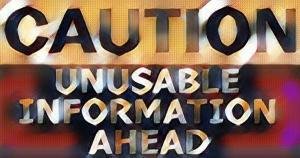Completely Unusable Information About How To Write Funny Punchlines

Note: There is additional important information related to this article located on the new Addendum page.
I was surfing online, looking for information on how to write a punchline when I came across an article from eHow.com called “How To Write A Punchline” --- supposedly for those who want to know how to be a stand-up comedian.
There were 5 points presented, all of which were generic at best and accurate in a general way, but tip #4 for how to write a punchline actually made me laugh out loud:
A punchline needs to be funny! It's not enough to make a witty observation if you're actually trying to entertain an audience. Write punch lines that you can present in a comedic way. Whether you decide to add sound effects, facial expressions or voice inflections to your punch lines, they need to be funny.
Now that is some sage advice for sure. Why I didn't I think of that???!!! 🙂
But allow me to propose that...
Merely telling folks who want to know how to be a comedian that punchlines need to be funny doesn't do much in the way of actually helping someone even come close to "writing" or developing stand-up comedy material/punchlines that will actually work for them.
That's no different than paying for a comedy workshop or class, performing for the class and then having the teacher say:
“You have great material, great ideas. Now all you have to do is make it funny.”
Another Example
Here's another example of this sort of "critical" information a comedian must know: A punchline contains an unexpected "twist" or angle that uses the element of surprise. Now I want you to ask yourself this:
"How does that help in any possible way to produce punchlines that will actually get laughs in your stand-up comedy material?"
I submit to you that it doesn't --- not in the slightest. Here is a mock conversation that exemplifies the kind of non-information new comedians encounter and are basically forced to work with when it comes to developing and delivering a stand-up comedy routine:
Person #1: What's the best way to get to Cleveland?
Person #2: The best way to get to Cleveland is by taking your car to get there.
Person #1: I know that. What's the best road to take to Cleveland?
Person #2: The best road to take to Cleveland is the one that will get you there fastest.
Person #1: Yes but WHICH exact road do I take?
Person #2: You will want to take the exact road that will get you to Cleveland.
While the answers provided by Person #2 are technically accurate, they don't provide so much as hint of usable information that will help Person #1 get to Cleveland.
This mock exchange perfectly illustrates the kind of non-information comedians use to try to develop and deliver a stand-up comedy routine -- even from so-called stand-up comedy experts.
Just know this: There is a lot of easy to understand and easy use information about generating punchlines that actually have laughter power right from the start.
But that information has to be used in context and in relation to the other important aspects of creating and developing a powerful stand-up comedy routine in order to work effectively.
Otherwise, it would be no different than trying to study a pile of bricks in order to figure out how a brick house is built from the foundation to the completed house.
Related article: Still Trying To Figure Out How To “Write” Punchlines Out Of Thin Air? Now That’s Funny
It’s really no wonder that funny and talented people struggle so hard with developing their stand-up comedy material given this type of non-information to work with.
The Bottom Line
I want every new comedian to be able to recognize when they are trying to use non-actionable information to develop and deliver a stand-up comedy routine instead of the actionable info they really need. That's what this article (and this blog) is really all about.
Otherwise, they will end up spinning their wheels for months if not years in the typical new comedian circle jerk cycle, trying to guess what may or may not be funny and never really knowing why their stand-up comedy material flops (or why some parts work for that matter).
I also know from my experience at literally hundreds of stand-up open open mic nights that most of the people who hit the stage that it's usually not a lack of comedy talent that holds new comedians back.
It's a lack of knowledge on how to effectively and efficiently capture, hone, harness and deliver the already developed comedy talent they have for the stand-up comedy stage.
Stand-up comedy material that works (or doesn't work) is a direct reflection of the process a comedian uses to develop and deliver their stand-up comedy material. And if that process is not working and providing the laughter results a comedian wants, it seems to me that a different and far more effective process should be considered --- preferably sooner rather than later.
Here's my advice for those who want to know how to be a comedian:
If you have a project and you need a hammer but you’re handed a pair of nose hair clippers --- I’m going to say that whatever task you are trying to accomplish will be much more difficult than it actually has to be.
Just be aware enough to recognize when you have been handed a pair of nose hair clippers instead of the hammer you actually need to get the job done.
